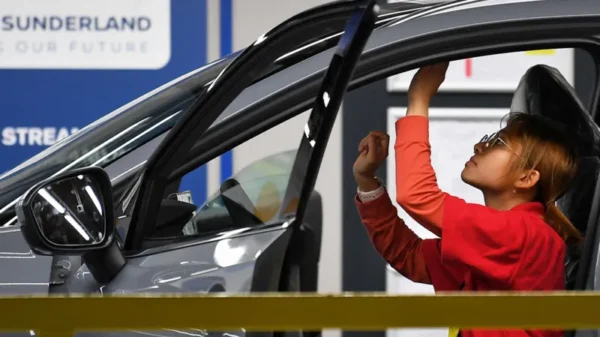There are 2,000 thriving Amish businesses in the Lancaster, PA area, Donald B. Kraybill, a retired professor at Elizabethtown’s Young Center for Anabaptist and Pietist Studies, told the New York Times. Many are worth several million dollars.
More and more of those businesses are not strictly agrarian. Many now function with the aid of technology, which the Amish traditionally shun.
Amish communities are growing rapidly, the Times notes, citing an August report by researchers at Elizabethtown College near Lancaster that estimates the Amish population in the U.S. at 313,000. That figure represents a 150 percent increase from 25 years ago.
Most of the growth occurs internally. On average, the Times says, an Amish married-woman has seven children. Marriage is more common in their tight-knit communities than in America as a whole, and they tend to marry younger than the average American does.
With the population growth, farmland has become scarce and more expensive, compelling many Amish people to relocate to rural areas in places like upstate New York, and/or to adopt business trades. In many cases, the move toward such trades necessitates increased interaction with the non-Amish community and requires the Amish to commute into cities for work.
Both of those demands entail the use of modern conveniences and technology traditionally prohibited within the sect.
Moses Smucker, an Amish man who lives in Lancaster, runs a food store and sandwich shop, Smuckers Quality Meats and Grill, in Philadelphia, which lies 80 miles east of Lancaster. Six days a week, a non-Amish driver to takes Smucker, who does not drive a car, into the city.
Smucker told the Times he enjoys escaping the city after his work is done. “Philadelphia is very fast-paced,” he said. “Then I go home, and I can drive my horse. I enjoy horses. Some people don’t, but I do. It slows everything down.”
With regard to technology, Smucker said: “You have to do what you have to do to stay in business. People are starting to understand that.”
Smucker’s shop, which gets four and a half stars on 80 reviews on Yelp!, accepts credit cards as payment.
Amish Country Gazebos, which supplies landscaping structures for the Marriott, the Hilton, Harrah’s and other notable chains, operates online and makes deliveries using its own trucks.
John, an Amish man in his late 60s, cuts wood for the gazebo company using a computer-driven crosscut saw. (Like many people who appear in the Times article, John, in deference to Amish values of humility, declined to provide his surname.)
“We call him the computer geek sometimes,” John’s son, Junior, told the Times.
Sam, a 29-year-old Amish man, used to make deliveries for Amish Country Gazebos, but now works on a computer in the company’s shop. It was difficult for him to learn how to interact with the machine, but once he did, he saw how it could facilitate business operations.
“I thought, I need to know how this computer thinks, or the computer needs to know how I think—we need to get along!” he said, per the Times.
Now, he appreciates the efficiency of the machine. “I can easily see it helping as far as numbers go — oh my goodness — to get rid of all these papers.”
But, Sam told the Times he has “never thought about bringing a computer” onto his property in Lancaster. Like many in his community, he draws a sharp line between business and home life, especially with respect to technology.
Still, technology is becoming part of the fabric of Amish life even at home. Many members of the community use lawnmowers and other electric yard-care equipment.
Though hooking into a public utility feed remains unheard of, some Amish people electrify their homes using power generators and solar panels.
Smartphones are becoming increasingly common in the community. The opening of the Pandora’s box that is the internet has given rise to fears about pornography and excessive influence from the outside world.
Through social media, for instance, Amish children may develop romantic attachments toward non-Amish peers—Amish rules frown upon such relationships.
“There’s always a concern about what would lead our young folk out of the church and into the world,” said John.
“Amish life is about recognizing the value of agreed-upon limits,” Erik Wesner, an author who studies the Amish way of life and runs a blog called Amish America, “and the spirit of the internet cuts against the idea of limits.”
While Marilyn, an 18-year-old Amish woman, values limits—she said she made an effort to respect church leaders’ wishes by limiting her cell phone usage in church—she says there must be a limit to the Amish’s resistance to technology.
“We can’t live like we did 50 years ago because so much has changed,” she said. “You can’t expect us to stay the same way. We love our way of life, but a bit of change is good.”
John’s wife, Lizzie, was disturbed by people’s obsession with their phones. “People are treating those phones like they are gods,” she told the Times. “They’re bowing down to it at the table, bowing down to it when they’re walking. Here we say we don’t bow down to idols, and that’s getting dangerously close, I think.”
Having lived without technology for so long, the Amish are more sensitive to its effect on human interaction than others are, Kraybill said per the Times.
Despite the concerns it raises in the community, technology is becoming more and more necessary as the Amish adapt what Kraybill calls their ““very entrepreneurial, very capitalistic” spirit for the 21st century.
“We’re not supposed to have computers; we’re not supposed to have cell phones,” said John. “We’re allowed to have a phone, but not in the house. But to do business, you need a computer, or access to one, and that phone moves into the house. So how do you balance that?”
Featured image via Wikimedia Commons































































Comment Template